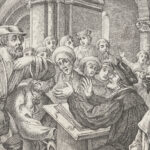One hundred years from now, when historians recount the events of 2024, they’ll almost certainly write about the division of the country. They’ll describe how Democrats and Republicans couldn’t seem to agree on anything. They’ll probably have plenty to say about Donald Trump, Joe Biden, Kamala Harris, and the intensity of the presidential election.
But I hope our children and grandchildren will read about more than our choice for president or our stance on immigration. Lord willing, they won’t reduce us to a single vote or explain away our values and beliefs by simply lumping us into one of two parties. Life in 2024 is more complex than that.
As any future historian would know, Americans in 2024 cannot be defined by a single political viewpoint. Our beliefs about God, family, the church, and morality cannot be captured by simply scanning political speeches, debates, or newspaper op-eds. Merely labeling us “conservative” or “liberal” would overlook our individual personalities and experiences and would suggest to later generations that we all shared the same definition of those terms. Responsible historians know better.
Unfortunately, what Americans in 2024 wish to be recorded and what Americans in 2124 will want to read might not be the same thing. And historians don’t always write history out of the goodness of their hearts. Simplistic, revisionist history often sells better.
Avoid Being Overly Simplistic
Many American historians today suffer from the same condition we’re witnessing in contemporary politics: being overly simplistic. Their narratives are too flat. Their figures are either good or bad, their plots boil down to having too much power or not enough, and their histories are either polemical or hagiographic. The founding fathers were either evangelical Christians who desired God’s glory above all or white supremacists motivated solely by self-interest and the perpetuation of slavery. Abraham Lincoln was either a radical abolitionist or a tyrant. Social reformers were either anarchists or champions of universal human equality.
These kinds of dualistic narratives sometimes feel more like the Star Wars universe than American history. But that’s not real life. Americans who fought against prejudice often had their own prejudices. People who were oppressed often oppressed others. Theologians with great ideas often didn’t live up to those ideas. If we don’t have nuance (and an eye for irony), history can leave us starry-eyed at the past and discouraged by the present.
Many American historians today suffer from the same condition we’re witnessing in contemporary politics: being overly simplistic.
At the risk of stating the obvious, America has been far more divided than it is in 2024. Yet even as our adolescent nation barreled toward civil war, the country was more than just North and South, anti-slavery and pro-slavery. In the North, there were groups like copperheads (anti-war Democrats), doughfaces (Southern sympathizers), butternuts (those in the border states), and Radical Republicans (the most outspoken against slavery). In the South, there were fire-eaters (leading voices for secession), Unionists (opponents of secession), and later carpetbaggers (Northerners who moved to the South) and scalawags (Southerners who worked with Northern Republicans). As a result, we now know that 19th-century Americans were experts at nicknames. On the issue of slavery, there were abolitionists, colonizationists, Free-Soilers, and gradual emancipationists.
When the nation was fracturing, Americans were still as kaleidoscopic as they are today. If we skip over these complexities of American life, we miss out on the triumph of the Lincoln presidency—how he was able to bring together a host of different people and ideologies for a singular cause. We also miss out on the hard work of Reconstruction and why our country still seems so divided at times. The details of history help us make more, not less, sense of the present.
Embrace Complexity Without Relativity
Early in her 1869 novel Oldtown Folks, Harriet Beecher Stowe observes: “Every individual is part and parcel of a great picture of a society in which he lives and acts, and his life cannot be painted without reproducing the picture of the world he lived in.” What’s true of the fictional history she described is also true of actual history. The greatest molders and shapers of American history were still reflections of the world they sought to reform. We shouldn’t expect an 17th-century Puritan, a 19th-century Transcendentalist, or a 20th-century fundamentalist to behave or think like a 21st-century millennial.
The details of history help us make more, not less, sense of the present.
Understanding human limitations gives us more patience when the figures of the past don’t live up to our ideals (or their own). It also gives us more appreciation for what these individuals were able to achieve during their lifetimes. Historical context should provide us with enough background and circumstance to humanize those figures we idolize and to keep us from stereotyping those we despise.
But simply because we acknowledge complexity doesn’t mean we sacrifice moral clarity. Historiography (the writing of history) shouldn’t be a via media approach wherein we refuse to acknowledge right and wrong. Just as there’s no such thing as a “naked public square” in politics, there’s no way to write purely neutral history. It’s perfectly acceptable, and even preferable, to carry our beliefs about God, ethics, and truth into the past, so long as we attempt to acknowledge our preconceptions and lay them out to the reader before we begin.
In my opinion, the best way to write history, especially in our simplistic era, is to take a complexity-without-relativity approach. People can’t be reduced to heroes and villains. Christians of all people should understand this, at least those who believe in an Augustinian view of humanity, wherein divine image-bearers reflect God’s goodness even while they fall short of his glory (Gen. 1:26; Rom. 3:23).
Practice Compassion amid Contradictions
Instead of setting truth aside or reducing history to protagonists and antagonists, we can show the complexity of human decision-making. That’s hard to do because seeking to understand another person—alive or dead—requires a level of courtesy and compassion most people don’t possess.
To some degree, writing history is always a moral act because it can never be divorced from honesty and personal integrity. If you’re not willing to shed light on your own sin and show grace to others in this life, you won’t be willing to do the same to others who came before you. Character matters—in politics and history. When the failures of one presidential candidate blind us to the failures of another, we slowly lose the ability to distinguish between platforms and people, and between right and wrong. And when our acceptance of someone’s sin is determined by his or her party or policy, we’ve unwittingly given one person the authority to determine for us what’s good and evil.
If you’re not willing to shed light on your own sin and show grace to others in this life, you won’t be willing to do the same to others who came before you.
Instead, we should believe that the God who judged George Washington by more than his unparalleled military accomplishments and founding of America will also judge us by more than our stance on a single political issue. With a sense of awe and reverence for the God who judges the thoughts and intentions of the heart, deep historians must be, to some extent, deep people. If you’re reducing today’s politics into simplistic narratives without regard for the complexity of human decision-making and personal motivations, you’re probably doing the same thing with the people of the past. We should have conviction. We should stand on principle. But we should never treat people like they’re simple. Everyday experience tells us they’re not.
Want to be a better historian? Be a better person. Balance sin and grace with your subjects the same way you attempt (I hope) to do so in your own life and relationships.
Thankfully, Christians have eyes to see two of the most complex aspects of history: contradiction and change. As much as it may pain us to admit, human beings often hold contradictory ideas at the same time. You’re probably reading these words and thinking of a particular person you know who suffers from this disease. One hundred years from now, Americans will likely judge that you, too, were inconsistent on some matters.
Sin has made us a double-minded and hypocritical people (James 1:8; Matt. 23:13–29). So we should expect to encounter that same condition in the greatest men and women of history—with Christ as the only exception.
Christians also understand more than any group of people that the most inconsistent, hypocritical, and confused sinners have the potential to change. People don’t stay the same. Whether you’d like to believe so or not, you’re not the same person you were 20 years ago. Even one year ago. If someone writes a book about your life, you hope they’d be skilled and disciplined enough to demonstrate that transformation. In the meantime, our testimonies of sin and salvation should supply us with just enough wisdom to see history is a complex story that deserves to be told, warts and all.
“The Most Practical and Engaging Book on Christian Living Apart from the Bible”
 “If you’re going to read just one book on Christian living and how the gospel can be applied in your life, let this be your book.”—Elisa dos Santos, Amazon reviewer.
“If you’re going to read just one book on Christian living and how the gospel can be applied in your life, let this be your book.”—Elisa dos Santos, Amazon reviewer.
In this book, seasoned church planter Jeff Vanderstelt argues that you need to become “gospel fluent”—to think about your life through the truth of the gospel and rehearse it to yourself and others.
We’re delighted to offer the Gospel Fluency: Speaking the Truths of Jesus into the Everyday Stuff of Life ebook (Crossway) to you for FREE today. Click this link to get instant access to a resource that will help you apply the gospel more confidently to every area of your life.

































